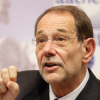Javier Solana

Javier Solana
Francisco Javier Solana de Madariaga, KOGFis a Spanish physicist and Socialist politician. After serving in the Spanish government under Felipe Gonzálezand Secretary General of NATO, he was appointed the European Union's High Representative for Common Foreign and Security Policy, Secretary General of the Council of the European Union and Secretary-General of the Western European Union and held these posts from October 1999 until December 2009...
NationalitySpanish
ProfessionPolitician
Date of Birth14 July 1942
CountrySpain
work together as a strong team for the future of the country.
I think in a few days we will be in a position to convey again the situation to the different governments and probably take a decision soon. There is a lot of work to be done.
to abandon their isolation and agree, as the Albanians have done, to join the consulting governing bodies of the province which work with the international administration.
EU foreign ministers agreed on Monday that member states will be producing a report on East Jerusalem that will be ready for the December 12 (foreign affairs) council meeting. This is not the final document. Work is still ongoing,
Further work continues to be necessary in order to make this possible, including explaining what we plan to do to European public opinion, as well as to our international partners, including the US but also China too.
I got the impression from the government that they don't see any basic difficulties in parliament ... Parliament is is recess but people continue to work on the law.
The EU is willing to develop all-around strategic partnership with China, ... With our goals converging ever more closely, it makes sense to work together ever more closely.
Unfortunately, it is highly probable that a weapon went astray and hit civilian buildings,
We're going to continue working politically ... the behavior (of the Russians) is completely unacceptable,
We want to prove to Lebanon our support in establishing strong relations on political and economic levels between Lebanon and the European Union.
Ukraine is very profoundly divided. We have to do our utmost so that this country is able to rally together and so that we don't have this profound division. We still have time for a dialogue.
We want to take a decision that is part of a solution, not part of a problem, and therefore it has to be well explained and understood by everybody.
We want to see how we can help organize the transfer.
We are looking with interest at that proposal. It is a proposal in which enrichment would be done outside, in Russia, but at the moment no agreement has been reached between Russia and Iran.